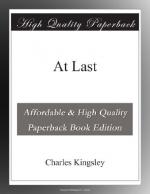The only malady that put Herbert Dorrance in frequent and unpleasant remembrance of his mortality was a fierce headache, which had of late years supervened upon any imprudence in diet, and upon excessive agitation of mind or physical exertion. His invariable custom, when he awoke at morning with one of these, was to trace it to its supposed source, and after determining that it was nothing more than might have been expected from the circumstance, to commit himself to his wife’s nursing for the day.
She ought, therefore, to have been surprised when, while admitting that the pain in his head was intense, he yet, on the morrow succeeding Mrs. Tazewell’s funeral, persisted in rising and dressing for breakfast.
“It must have been the roast duck at dinner yesterday,” he calmly and languidly explained the attack. “It was fat, and the stuffing reeked with butter, sage, and onion. An ostrich could not have digested it. I was tired, too, and should not have eaten heartily of even the plainest food.”
Mabel neither opposed nor sustained the theory. She had slept so ill herself as to know how restless he had been; had heard his hardly suppressed sighs and tossings to and fro, infallible indications with him of serious perturbation. Had his discomfort been bodily only, he would have felt no compunction in calling her to his aid, as he had done scores of times. Her sleepless hours had also been fraught with melancholy disquiet. Putting away from her—with firmness begotten by virtue born of will—and so much of this thoughtfulness as pertained to the bygone days with which Frederic Chilton was inseparable associated, she yet deliberated seriously upon the expediency of speaking out courageously to Herbert of the relation this man had once borne to her, the incidents of their recent meeting, and the effect she saw was produced upon her husband’s mind by the sight of him.
“If we would have this negative happiness continue, this matter ought to be settled at once and forever,” she said, inwardly. “He must not suspect me of weak and wicked clinging to the phantoms of my youth; must believe that I do not harbor a regret or wish incompatible with my duty as his wife. I will avail myself of the first favorable moment to assure him of the folly of his fears and of his discomfort.”
Another consideration—the natural sequence of her conviction of his unhappiness—was a touching appeal to her woman’s heart. If he had not loved her more fervently than his phlegmatic temperament and undemonstrative bearing would induce one to suppose, he would not dread the rekindling of her olden fancy for another. The image of him who, she had confessed, had taught her the depth and weight of her own affections, whom she had loved as she had never professed to care for him, would not have haunted his pillow to chase sleep, and torture him with forebodings.
“I must make him comprehend that Mabel Aylett at twenty, wilful, romantic, and undisciplined, was a different being from the woman who has called him ‘husband,’ without a blush, for fourteen years!”




